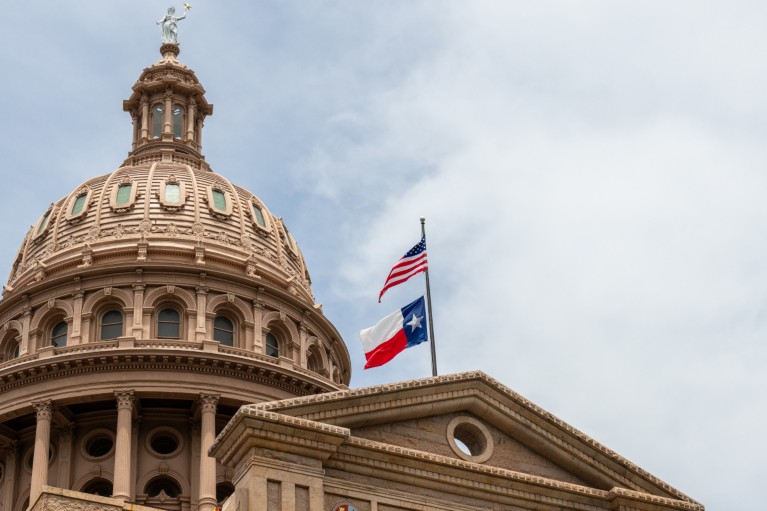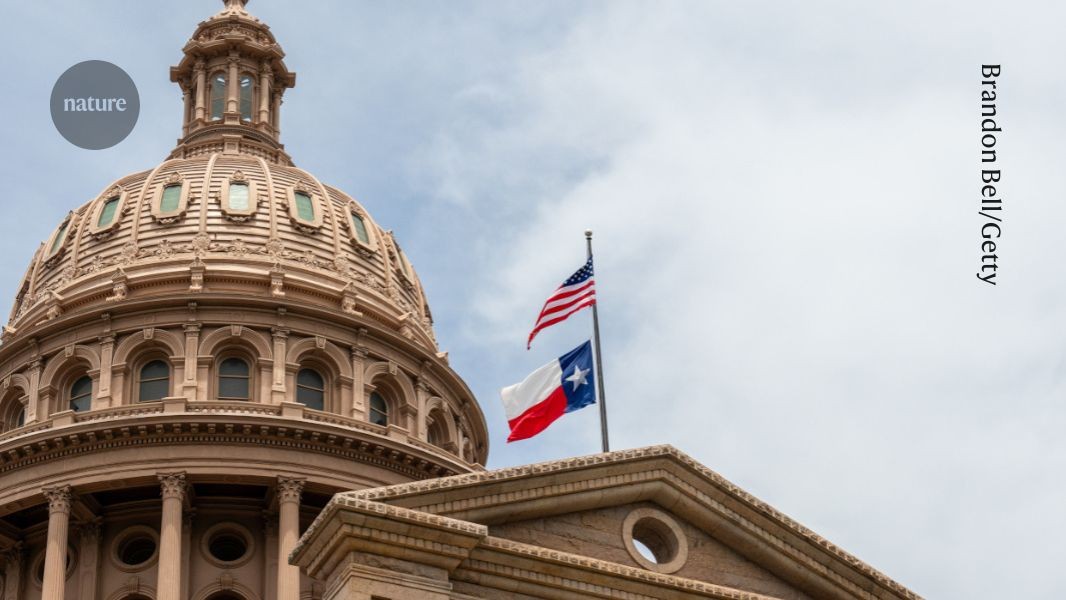
Academics in the southern United States, including in Texas (for which the State Capitol is pictured), describe how political pressure is affecting them.Credit: Brandon Bell/Getty
Educators at colleges and universities across the southern United States, which are dominated by Republican-controlled state legislatures, face policing of their classes, pressure to self-censor and an undercurrent of fear and anxiety, according to a survey of almost 4,000 academics. One-quarter of them say that they are actively looking for jobs outside their state.
“The fear is across disciplines,” says Matthew Boedy, president of the Georgia Conference of the American Association of University Professors (AAUP), which conducted the survey. “No wonder so many are looking for other jobs.” Based in Washington DC, the AAUP advocates for academic freedom and shared governance.
The Faculty in the South Survey was distributed by e-mail and social media in August to more than 20,000 faculty members across 12 southern states — Alabama, Arkansas, Florida, Georgia, Kentucky, Louisiana, Mississippi, North Carolina, South Carolina, Tennessee, Texas and Virginia — as well as to AAUP national members. Of the 3,926 respondents, 51% self-identified as female, 83% identified as white and more than 60% said that they hold tenured positions. (The poll has been run annually since 2022; the 2024 survey received 2,924 responses.)
Around 55% of respondents would not recommend their state as a desirable place to work, and one in four is actively looking for jobs elsewhere. (Of the ten main destination states listed, seven are outside the south: California, New York, Massachusetts, Colorado, Pennsylvania, Illinois and Michigan.) Seventeen per cent say that they’ve had their class content or syllabi questioned by the university administration — one of two new questions this year. The other new question asked whether respondents have had any federal contracts cancelled by the administration of US President Donald Trump; just over 10% said yes.
The results came out less than a week before the fatal shooting of Charlie Kirk, a Trump ally, at an event at Utah Valley University in Orem. In the aftermath, educators nationwide have been disciplined or fired over comments in reference to Kirk that their employers deemed inappropriate.
‘Climate of fear’
The southern United States is relatively conservative politically, and has been for decades. The most cited reason for looking for jobs was the political climate, at 57%, followed by salary (51%) and academic freedom (46%). In 2024, the top justifications were the same but ranked differently: salary (57%), political climate (53%) and academic freedom (50%).
A question about the impact of attacks on higher education garnered more than 2,700 responses. “One of the most repeated themes in the responses was about the climate of fear and anxiety on campus,” Georgia AAUP wrote in a statement.
One respondent wrote that they were fearful of “ambush videos which take course and class discussions out of context”.
Exclusive: a Nature analysis signals the beginnings of a US science brain drain
Melissa McCoul, a senior lecturer of English literature at Texas A&M University in College Station, was fired just days after the AAUP survey was released, after a student posted a viral video on social media objecting to her teaching that there are more than two genders. According to a statement from her attorney, Amanda Reichek, McCoul’s notice of termination “alleges that she was ‘instructed on numerous occasions to change the course content to align with the catalog description and the course description that was originally submitted and approved’ yet failed to do so”. However, she continues, McCoul’s course content “was entirely consistent with the catalog and course description”, and she was never told otherwise. McCoul “has appealed her termination and is exploring further legal action”.
DiAnna Hynds, a neuroscientist at Texas Woman’s University in Denton and one of the survey respondents, feels the weight of political pressure from both the federal and the Texas state government.
“I am discouraged because of the devaluation of my chosen career. I love teaching and training the next generation of scientists and leaders,” says Hynds, who studies the regenerative properties of neurons and their applicability to recovery from spinal-cord and traumatic brain injury.
“But with an increase in hostility and lack of appreciation for the value of generating knowledge, it becomes difficult to maintain motivation,” she says. If things get too dire, she adds, she’d consider retiring earlier than planned.



